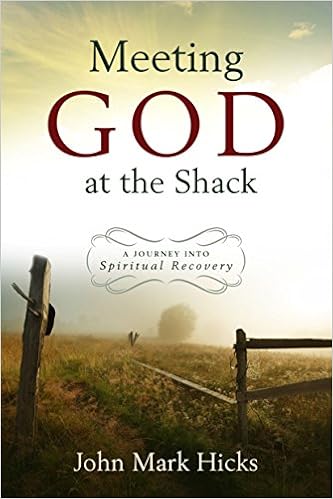I Will Go See “The Shack: The Movie”
While some have perhaps read The Shack as an actual account, the title page identifies the piece as a “novel.” This is a fictional story. But…it is nevertheless true. The movie, too, is fictional…but true.
Read The Shack, watch the movie, and walk with me into the world of spiritual recovery, a journey into my shack and your shack (Meeting God at the Shack, my new book). That is what The Shack is about.
The book, as well as the movie, is a modern parable. Like a parable, the events described are fictional though possible (that is, it is not science fiction). And, like a parable, it becomes a world into which we step to hear something true about God, life, and the soul. 
The Prodigal Son (Luke 15), for example, is a fictional but true story. As fiction the story has no correspondence in fact, that is, it is not a story about a specific, actual family. No one walked up to Jesus after the parable to ask the name of the son, which family he came from and into which “far country” he went. Whether it is actual history or not is irrelevant. It is a fictional tale. But the story is nevertheless true. The Prodigal Son says something true about God and his relationship with his children.
A parabolic story draws the listener or reader into the world of the parable so that we can see something from a particular angle. A parable is not comprehensive theology, but a story-shaped way of saying a particular thing. As a piece of art rather than didactic prose, it allows a person to hear that point in an emotional as well as intellectual way. It gives us imagery, metaphor, and pictures to envision the truth rather than merely describing it in prose. Rather than analyzing propositions, we become part of a parable’s narrative. We are free to experience our own life again as we are guided by the storyteller.
Parables, as the parables of Jesus often do, sucker-punch us so that we begin to see something we had not previously seen about ourselves, God or the world. They speak to us emotionally in ways that pure prose does not usually do, much like music, art and poetry are expressive in ways that transcend discursive or academic descriptions. This enables the right side (the artsy side) of our brains to connect with what the left side (the analytical side) of our brain thinks about. We can feel these truths rather than simply think about them. As a result those truths can connect with our guts (our core beliefs about ourselves) in ways that our intellect cannot reach. The truths, then, can settle into our hearts as well as our minds.
The Shack is, I think, a piece of serious theological reflection in parabolic form. It is not a systematic theology. It does not cover every possible topic nor reflect on God from every potential angle. That is not its intent. That would be too much to expect from a parable. The “Prodigal Son,” for example, is not a comprehensive teaching about God.
Rather, the focus of The Shack is rather narrow. Fundamentally, given my own experience and hearing Young talk about his intent, I read the book as answering this question:
How do wounded people journey through their hurt to truly believe in their gut that God really loves them despite the condition of their “shack”?
The parable is about how we feel about ourselves in our own “shacks.” Do we really believe—deep in our guts, not just in our heads—that God is “especially fond” of us? How can God love us when our “shacks” are a mess? The parable addresses these feelings, self-images and woundedness.
The theology of The Shack engages us at this level. It encourages us to embrace the loving relationship into which God invites us. Consequently, it does not answer every question, address every aspect of God’s nature or reflect on every topic of Christian theology. Instead, it zeros in on the fundamental way in which wounded souls erect barriers that muzzle the divine invitation to loving relationship.
So, I invite you to reflect on these themes—to process them within your own journey, out of your own woundedness, and in relationship with your own God. I invite you to walk with me through my own spiritual journey of recovery and perhaps illuminate your own walk with God.
May God hear our prayers for healing, meet us in our shacks, and love us so profoundly and deeply that our wounds become scars rather than festering sores.
February 18th, 2017 at 7:50 pm
John Mark,
May I repost this on my blog?
DT
February 20th, 2017 at 4:58 pm
Of course…public material as far as I am concerned. 🙂
February 19th, 2017 at 6:37 am
Thanks for writing this book and sharing more of your journey. I’m eager to get a copy of your new book. I’m already thinking of a few people who might benefit from it.